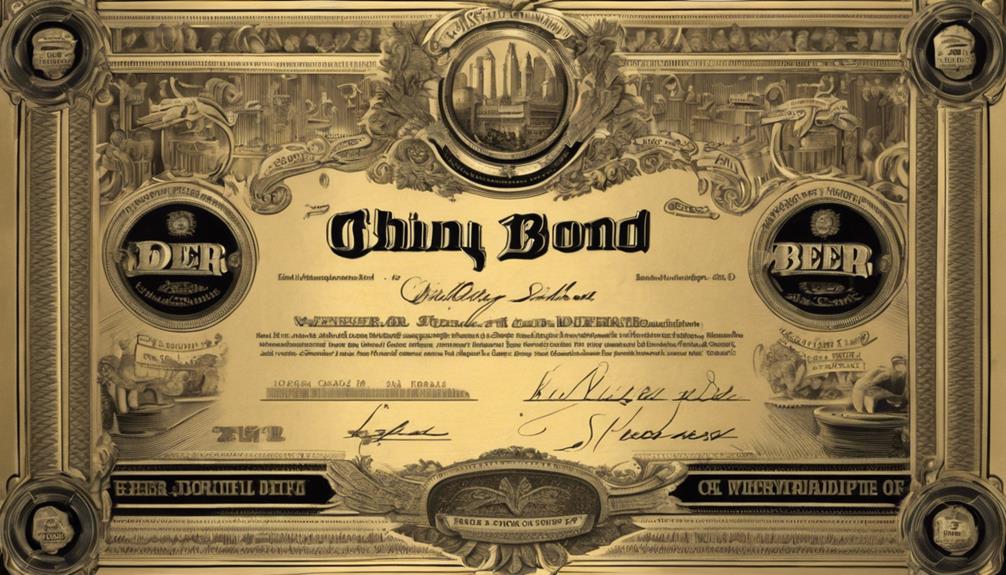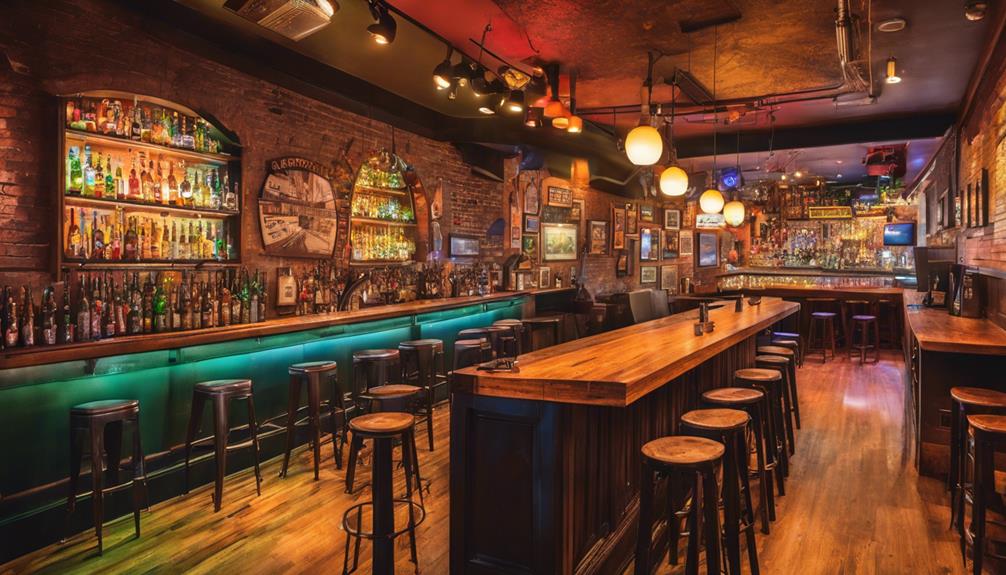If you're considering selling beer on your premises in Texas, understanding the TABC Performance Beer Retailer's on Premise License (BE) bond is essential. This $4,000 bond not only protects consumers but also shows your commitment to following state regulations. You might think the application process is straightforward, but there are nuances that can trip you up. Before you jump in, it's crucial to grasp the implications of this bond on your business. What happens if you don't comply? The answer could significantly impact your operations.
Understanding TABC Bonds

When you're diving into the world of TABC bonds, it's essential to grasp their purpose and significance. TABC, or the Texas Alcoholic Beverage Commission, requires certain businesses to obtain bonds to ensure compliance with state regulations. A TABC bond acts as a financial guarantee, protecting the state and consumers against potential losses due to violations of alcohol laws.
Similar to California Surety Bonds, these bonds are crucial for establishing credibility within your industry.
As a retailer, you'll find that TABC bonds are mandatory for obtaining your Performance Beer Retailer's License. These bonds demonstrate your commitment to operating within the legal framework and adhering to responsible business practices. If you fail to comply with the regulations, the bond can be used to cover fines or penalties, ensuring that the state isn't left holding the bag.
Understanding TABC bonds not only helps you fulfill legal requirements but also enhances your business's reputation. By securing a bond, you show your customers and the state that you're serious about running a reputable establishment.
Importance of the BE Bond
The BE bond is a critical component for any retailer looking to thrive in the competitive beer market. This bond isn't just a regulatory requirement; it serves as a safety net for both you and your customers. By securing this bond, you demonstrate your commitment to adhering to state laws and regulations, which can enhance your reputation among patrons and suppliers alike.
Understanding alcohol bonds and their compliance role is essential for success in this industry. Moreover, having a BE bond in place protects consumers and the public from potential financial loss due to your business's failure to comply with legal obligations. If your establishment were to engage in illegal activities, the bond provides a financial source to cover damages or fines, ensuring you take responsibility for your actions.
Additionally, the BE bond can help you secure better relationships with distributors and suppliers. They're more likely to partner with a retailer who shows financial responsibility and a commitment to operating within legal boundaries.
This bond can also give you a competitive edge, as it demonstrates a level of professionalism that might attract more customers.
In short, the BE bond isn't just a formality; it's essential for your business's success and sustainability in the beer retail industry.
Application Process Overview

Applying for a TABC Performance Beer Retailer's License Bond involves several straightforward steps that can streamline your entry into the beer retail market.
First, you'll need to gather essential documents, including your business plan, identification, and proof of your business location. This information helps demonstrate your commitment to operating responsibly. Additionally, it's important to understand the types of surety bonds that may be relevant to your business to ensure compliance with state regulations.
Next, you should contact a surety company to initiate the bonding process. They'll assess your financial standing, typically requiring a credit check and possibly additional documentation. Be prepared to discuss your business operations and financial history, as this can influence your bond's approval and premium.
Once the surety company has evaluated your application, they'll issue the bond if everything checks out. You'll then need to submit the bond to the Texas Alcoholic Beverage Commission (TABC) along with your license application. Remember, the bond amount for a Performance Beer Retailer's License is $4,000.
After submitting your application and bond, it's a matter of waiting for TABC's review. Once approved, you'll be ready to operate legally and responsibly in the beer retail market.
Eligibility Requirements
To qualify for a TABC Performance Beer Retailer's License Bond, you'll need to meet specific eligibility requirements set by the Texas Alcoholic Beverage Commission.
First, you must be at least 21 years old, as this is the minimum age for holding a license. Next, you should have a clean criminal record, particularly concerning alcohol-related offenses. Any felony or misdemeanor convictions related to the sale or distribution of alcoholic beverages can disqualify you.
Additionally, you'll need to provide proof of your business's legal structure, whether it's a sole proprietorship, partnership, or corporation. Ensure that your business is properly registered and compliant with local regulations.
It's also important to demonstrate financial responsibility, which often includes providing personal or business financial statements.
Furthermore, you should have a physical location for your business that meets zoning requirements for selling alcohol. This means verifying that your establishment is in a zone that permits the sale of alcoholic beverages.
Bond Costs and Fees

When considering a TABC Performance Beer Retailer's License Bond, you'll want to factor in the associated costs and fees. The bond itself usually requires a premium, which is a percentage of the bond amount—typically around 1% to 10%, depending on your creditworthiness. For a $4,000 bond, this means you could pay between $40 to $400 annually.
In addition to the premium, you might encounter other fees. These can include application fees charged by the surety company, which may range from $50 to $100. Some companies might also have service fees for processing your bond.
It's essential to read the fine print and understand all potential costs before committing.
Keep in mind that your credit score plays a significant role in determining your premium rate. If you have excellent credit, you'll likely secure a lower rate compared to someone with poor credit.
Finally, consider that bond prices can change over time, so it's wise to shop around and compare quotes from different surety companies to find the best deal.
Maintaining Compliance
Maintaining compliance with TABC regulations is crucial for your business's success and longevity. As a beer retailer, you'll need to stay informed about the latest laws and guidelines that govern your operations. Regularly review the Texas Alcoholic Beverage Code and TABC rules to ensure you're up to date.
Training your staff is another vital aspect of compliance. Make sure they understand the legal age for alcohol sales and the importance of checking IDs. Implementing a thorough training program can help prevent accidental violations and foster a responsible drinking culture at your establishment.
It's also essential to keep accurate records of your sales and inventory. Regular audits will help you track your compliance status and identify any potential issues before they escalate.
Additionally, maintaining proper signage regarding alcohol sales and consumption is key to informing customers about your policies.
Consequences of Non-Compliance

Failing to comply with TABC regulations can lead to severe consequences that jeopardize your business. If you're found in violation, you might face hefty fines that can quickly add up, impacting your bottom line.
Repeated offenses could even result in the suspension or revocation of your license, which halts your ability to operate legally. This isn't just a temporary setback; losing your license could mean the end of your business.
Additionally, non-compliance can damage your reputation within the community and among suppliers. A tarnished image could drive customers away, resulting in decreased sales and profitability.
You may also find it challenging to obtain future permits or licenses, as regulatory bodies will view your business with suspicion.
Moreover, your bond may be called into question, which can lead to further financial liabilities. If a claim is made against your bond due to a violation, you'll be responsible for covering the costs, and your surety company may increase your premiums.
In short, adhering to TABC regulations isn't just about following the law; it's about protecting your business, your reputation, and your financial stability.
Stay compliant to ensure your success in the competitive beer retail market.
Tips for Successful Renewal
Your license's renewal is crucial for keeping your beer retail business thriving, so it's essential to approach the process methodically.
Start by reviewing the specific renewal requirements outlined by the Texas Alcoholic Beverage Commission (TABC). Familiarize yourself with any changes in legislation that may affect your business.
Next, gather all necessary documentation well in advance. This includes your current license, financial statements, and any required permits. Having everything organized will save you time and reduce stress as the renewal deadline approaches.
Don't forget to pay your fees on time. Late payments can lead to penalties or even a lapse in your license, which could harm your business. It's a good idea to set reminders for yourself as the renewal date nears.
Consider reaching out to your local TABC office if you have any questions or need clarification on any requirements. They can provide valuable guidance and ensure that you're on the right track.
Conclusion
In conclusion, securing the TABC Performance Beer Retailer's on Premise License (BE) bond is essential for your business in Texas. It not only ensures compliance with state regulations but also protects your reputation and finances. By understanding the application process and maintaining compliance, you can avoid penalties and disruptions. Remember, a successful renewal keeps your business thriving. Take these steps seriously, and you'll set your establishment up for long-term success in the competitive beer retail market.


